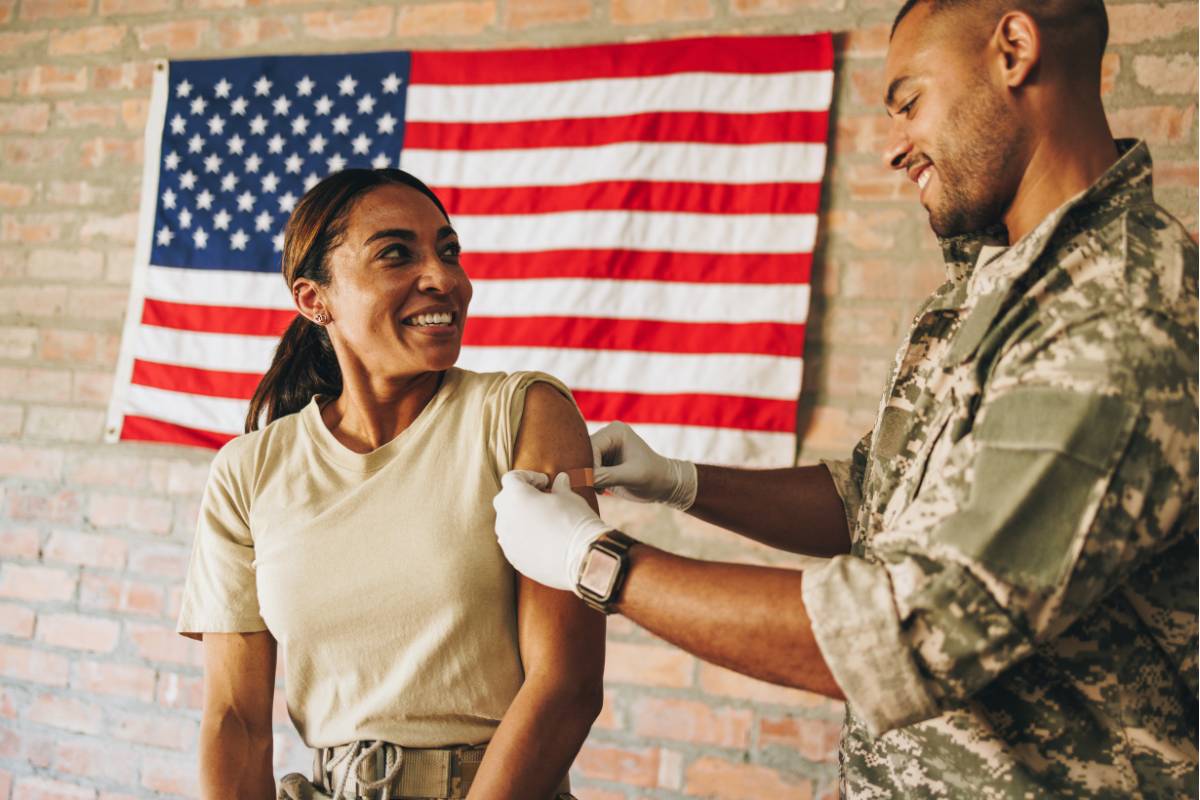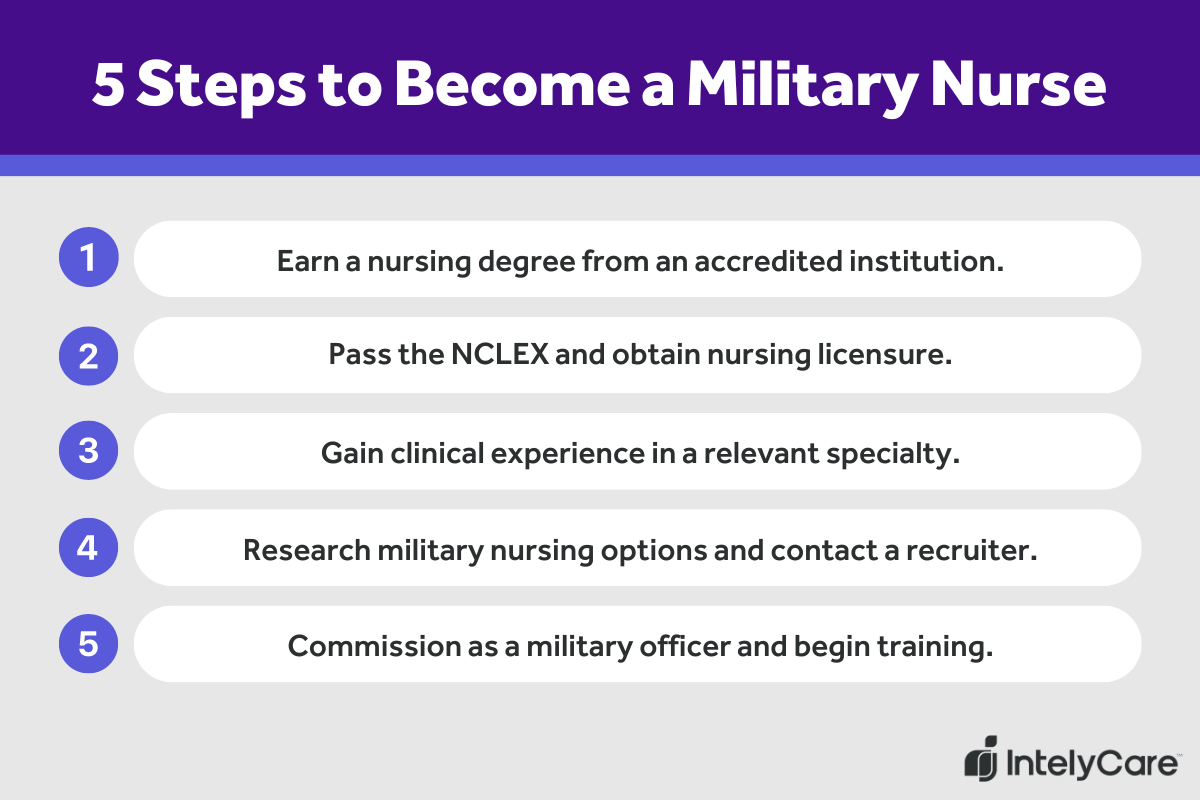Is Being a Military Nurse Right for You?

Picture this: A military nurse in a tent-like structure, at a forward operating base thousands of miles from home, is tasked with caring for three new patients — soldiers wounded in combat nearby. This is one glimpse of military nursing — a demanding yet highly rewarding career path that requires not only advanced medical skills but also a deep sense of patriotism and dedication to the military mission.
Military nursing can take many different shapes and forms, including working with sailors as a Navy nurse at sea, caring for patients being evacuated from hot zones as a flight nurse, and providing emotional support to veterans as a psychiatric nurse. Depending on which branch of the military you choose to work with, your experience will differ.
If you’re contemplating joining the ranks of military nurses and wondering if this career path is the right fit for you, read ahead to have your questions answered — educational requirements, responsibilities, salaries, and job outlook.
What Is a Military Nurse?
As the name implies, a military nurse is a nurse that works in any of the main branches of the military:
- Army nurses provide care to soldiers and their families in various settings, including hospitals, clinics, and field medical units. Army nurses may be deployed to support military operations worldwide.
- Navy nurses serve in naval hospitals, clinics, and aboard ships, providing care to sailors and their families. The Navy also provides medical care for the Marine Corps and associated dependents.
- Air Force nurses work in Air Force medical facilities, including hospitals and clinics on air bases. They may also be involved in aeromedical evacuation missions. An Air Force nurse will also provide healthcare services to the Space Force.
- Coast Guard nurses provide healthcare services to Coast Guard members and their families, often working in clinics and medical facilities.
- National Guard nurses are responsible for delivering a range of medical services for Guard members. Additionally, they may collaborate with civilian healthcare institutions during domestic emergencies and disasters, extending their expertise to support community health efforts.
Military nursing can take many forms depending on current events. During peacetime, think of working in a hospital with occasional national and international deployments. And during wartime, military nurses may be deployed to active war zones.
One thing you know for sure — this is a dynamic career where you’ll have to use all your nursing skills, like critical thinking, prioritization, and stress resilience. You’ll work in high-pressure situations, managing emergencies and saving lives. Remember those famous nurses you read about in nursing school? This could be your opportunity to make history.
Military Nurses Responsibilities
Just like other nurses, military nurses perform nursing assessments, administer medications, create care plans, and document their findings. But what about the unique responsibilities of nurses in the military? What do they do that other nurses don’t?
Here is a list of unique military nurse responsibilities you won’t find on a regular med-surg floor:
- Deployed healthcare: Deploying to active combat zones or humanitarian missions, providing critical medical care in challenging and high-stakes environments.
- Combat injury care: Training to handle traumatic injuries, including those sustained in combat situations.
- Aeromedical evacuation: Participating in aeromedical evacuation, caring for patients during air transport, often in military aircraft, ensuring their well-being during transit.
- Disaster response: Providing emergency medical assistance in the aftermath of natural disasters, conflicts, or other crises, both domestically and internationally.
- Triage and prioritization: Responding to combat situations or mass casualty incidents, military nurses are skilled in triage, quickly assessing and prioritizing patient needs based on the severity of injuries or illnesses.
- Operational support: Providing healthcare support to operational units, ensuring that military forces remain fit for duty, and addressing health-related issues that may impact mission readiness.
- Medical logistics: Managing medical supplies, equipment, and logistical aspects of healthcare delivery, ensuring that medical resources are available where needed.
- Crisis response coordination: Collaborating with other healthcare professionals, military leaders, and civilian agencies to coordinate healthcare responses during crises, emergencies, or large-scale military operations.
- Soldier education: Engaging in health promotion and preventive healthcare measures, ensuring that military personnel maintain optimal health to meet the demands of their service.
How to Become a Military Nurse
Becoming a military nurse involves specific steps, including meeting educational and professional requirements and completing military training. Here is a general guide with five steps to become a military nurse:

1. Earn a Nursing Degree
Obtain a bachelor of science in nursing (BSN) degree. Many military branches prefer or require a BSN for commissioned officer positions focused on nursing.
2. Obtain Licensure
Your next step is to obtain licensure as a registered nurse (RN). This typically involves passing the National Council Licensure Examination for Registered Nurses (NCLEX-RN).
3. Gain Clinical Experience
Acquire clinical experience as a nurse, preferably in a setting that aligns with military nursing, such as progressive care, acute care, and ICU nursing. Having relevant experience can make you a more competitive candidate for military nursing positions.
4. Research Military Nursing Opportunities
Research the different services of the military, such as the Army, Navy, Air Force, Coast Guard, Space Force, and Marine Corps. Each service may have specific requirements and roles for nurses. Contact a recruiter for the specific service you are interested in to learn about available positions and the application process.
5. Commission as a Military Officer
Apply for a commissioning program and go through the selection process. This involves meeting the officer commissioning requirements of the respective military branch, which may include completing a Reserve Officer Training Corps program, or a direct commissioning program like Officer Candidate School (OCS). If accepted, you will undergo military training specific to your service and may be required to commit to a certain period of service.
Active Duty vs. Reserve and National Guard
Serving as a military nurse in the active duty and reserve components of the U.S. military involves different commitments, responsibilities, and lifestyle considerations. Here are the key differences between serving as a nurse on active duty vs. reserve:
Active duty nursing:
- Full-time commitment: Active duty nurses typically work full-time on military bases or deploy to various locations as needed.
- Longer service obligation: Active duty nurses usually commit to longer service obligations compared to those in the reserve, often starting in active duty and then finishing their career in the Reserve or National Guard.
- Regular deployments: Active duty nurses may be subject to regular deployments, which can involve overseas assignments or being stationed in different parts of the world.
- Comprehensive benefits: Active duty nurses receive comprehensive benefits, including healthcare, housing allowances, retirement plans, and educational benefits.
- Career advancement opportunities: Active duty nurses have more opportunities for career advancement, leadership roles, and professional development. The military offers a structured career path with the potential for promotions and increased responsibilities.
Reserve nursing:
- Part-time commitment: Reserve nurses serve on a part-time basis, allowing them to maintain civilian careers or pursue their education while fulfilling their military obligations.
- Shorter service obligation: Reserve nurses could have shorter initial service obligations compared to active duty personnel, but this will depend on the terms of your military contract.
- Limited deployments: While reserve nurses may be subject to deployment, the frequency and duration are generally less compared to active duty.
- Military benefits: Reserve nurses are still eligible for certain military benefits, including healthcare and retirement benefits. However, the extent of these benefits differs from those provided to active-duty personnel.
- Flexibility: Nurses in the Reserve or National Guard generally have the ability to volunteer for a wider range of mobilizations or deployments as a way to help backfill active duty missions.
How Much Does a Military Nurse Make?
The average military nurse salary is around $70,000 annually, with a salary range between $58,000 and $100,000 per year. It’s important to mention that military nurses have a unique pay structure — your salary is tied to your rank and years of service.
Nurses typically enter the military as commissioned officers and are assigned a specific rank, based on their level of education and qualifications. This rank largely determines your paycheck. The highest pay grade in the military is an O-10 and corresponds to the highest-ranking officer. You’ll likely enter at one of the following ranks:
- Second Lieutenant (O-1): $43,646 or more
- First Lieutenant (O-2): $50,288 or more
- Captain (O-3): $58,197 or more
Your paycheck will vary significantly depending on whether you are in active duty or the reserves. And it’s important to note that military salary figures do not include additional allowances for housing and food, special pays, or sign-on bonuses.
The Pros and Cons of Military Nursing
Being a military nurse comes with its own set of unique challenges and rewards. Here are some pros and cons associated with this profession:
Pros of military nursing:
- Competitive pay: You’ll receive a competitive salary, and in addition to base pay, you may be eligible for special pay and allowances.
- Benefits: You’ll typically receive a comprehensive benefits package, including healthcare, housing allowances, and retirement plans. You’ll also be eligible for an accession bonus of up to $20,000 or $30,000 in exchange for a 3- to 4-year commitment.
- Educational opportunities: You’ll be eligible for various educational benefits such as military scholarships, tuition assistance, and loan repayment programs.
- Travel opportunities: You may have the chance to work in different locations, including overseas deployments. This provides a unique cultural and professional experience.
- Job security: You’ll have a stable career path with various opportunities for career advancement and professional development.
Cons of military nursing:
- Deployment: You may be deployed to conflict zones or locations far from home, leading to periods of separation from family and friends. This can be emotionally challenging.
- High-stress environment: You may be exposed to highly stressful situations, especially during times of conflict or crisis.
- Rigorous physical requirements: You may be required to meet certain physical fitness standards.
- Limited control over assignments: You may have limited control over your assignments and may be required to relocate frequently, disrupting personal and family life.
- Health risks: You may be exposed to situations involving combat injuries and trauma. This can take an emotional toll and lead to conditions like post-traumatic stress disorder (PTSD).
Military Nurse Jobs and More
Now that you’ve learned about military nursing, you can decide if it’s the right fit for you. Need more career help? Find out how IntelyCare can help connect you with great-fitting nursing jobs.

